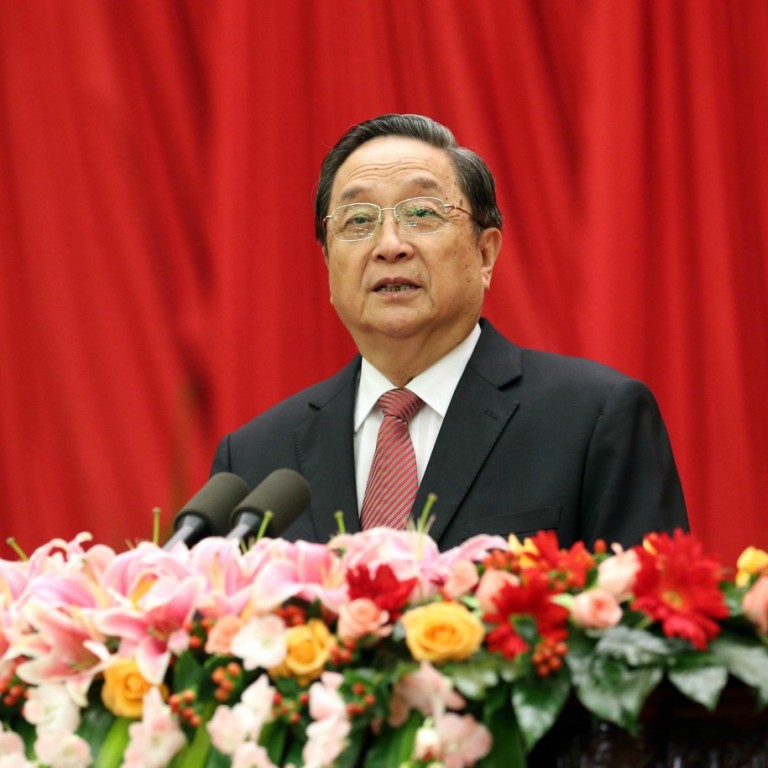
Speak freely - but choose your words carefully, Beijing warns Hong Kong politicians
Hong Kong delegates to the CPPCC can “say freely whatever they want” – but must not call for Leung Chun-ying to resign, a top Beijing official was quoted as saying.
Hong Kong delegates to the nation’s top political advisory body can “say freely whatever they want” – but they must not call for Chief Executive Leung Chun-ying to resign or criticise the local government in a manner that is not “constructive”, a top Beijing official was quoted as saying this morning.
Yu Zhengsheng, chairman of the Chinese People’s Political Consultative Conference (CPPCC), was quoted by standing committee insider Chan Wing-kee, hours before the committee is expected to vote to strip Liberal Party leader James Tien Pei-chun of his seat on the CPPCC.
Tien had called for Leung to consider resigning over the political crisis engulfing Hong Kong.
“In March, we passed a resolution … that we would support the Hong Kong SAR government and its chief executive in governing Hong Kong in accordance with the law. Yu said Tien asked publicly for the chief executive to resign – that violated the resolution,” Chan said in Beijing.
But he added that “Chairman Yu also made it clear that … it doesn’t mean that [a delegate] cannot criticise the chief executive – otherwise, it means there is no democracy … [But delegates] must criticise constructively.
“Oppositional voices shouldn’t be made public … If there are dissenting voices, they should be reflected to the central government directly,” Chan quoted Yu, Beijing's fourth most senior official, as saying.
“The CPPCC delegates, especially those from Hong Kong, can talk about or raise any issue … [and] they can continue to say freely whatever they want, but we must also follow this existing resolution [passed in March],” he further quoted.
Chan also said Yu told the standing committee that “as far as he can remember” it was the first time that the CPPCC had invoked its power, stipulated in the CPPCC Charter, to “cancel the qualification” of a delegate who has seriously violated a resolution.
Previous disqualifications had been made to punish “corrupted” delegates, he added.
Tien will speak to the media in Hong Kong at about 4pm, after the CPPCC vote.
Liberal Party vice-chairman Vincent Fang Kang said he “still hopes the central government can handle James Tien’s wrong remarks leniently”. The Liberals will hold a general meeting tonight to discuss the matter.
It is understood that Beijing’s liaison officials have briefed six Liberals and several other pro-establishment lawmakers on the CPPCC’s plan.
Tien did not attend the meeting, but his younger brother, New People’s Party (NPP) lawmaker Michael Tien Puk-sun attended and understood that Beijing still regards James Tien as a patriot.
“It doesn’t mean that the central government is now classifying my brother as not ‘loving the country and loving Hong Kong’, or not a member of the pro-establishment camp,” Michael Tien said.
He believed his elder brother’s remarks against Leung were “spontaneous” and provoked by Leung’s recent comments that an open election of the next chief executive would mean candidates focused too much on the poor.
James Tien found those remarks “unacceptable”, his brother said.
Speaking on Commercial Radio, former secretary for commerce and economic development Frederick Ma Si-hang said even if James Tien was expelled from the CPPCC, he could still criticise the government and the chief executive.
“[You] just can’t tell a person to resign lightly, you need to back it up with reasons and explanations. The chief executive is a powerful figure, [you] need to be careful when commenting,” Ma said, adding that no one is stopping Tien from criticising the government or the chief executive, but that now “he was not part of the game”.
Ma also said it was impossible for Leung to step down before the end of his five-year term. But he said Leung should work harder to overcome the challenges he was facing.
Ma also said the religion and sports sectors “definitely” make an economic contribution to society. He said the chief executive had already expressed regret over controversial remarks in which he said those sector contribute “zero” economically.
CPPCC delegate Tam Yiu-chung, who also chairs the Beijing-loyalist Democratic Alliance for the Betterment and Progress of Hong Kong, said James Tien’s case doesn’t mean that there’s no freedom of speech for delegates.
NPP chairwoman Regina Ip Lau Suk-yee said James Tien had repeatedly ignored pro-establishment figures’ advice for him not to criticise Leung too harshly.

